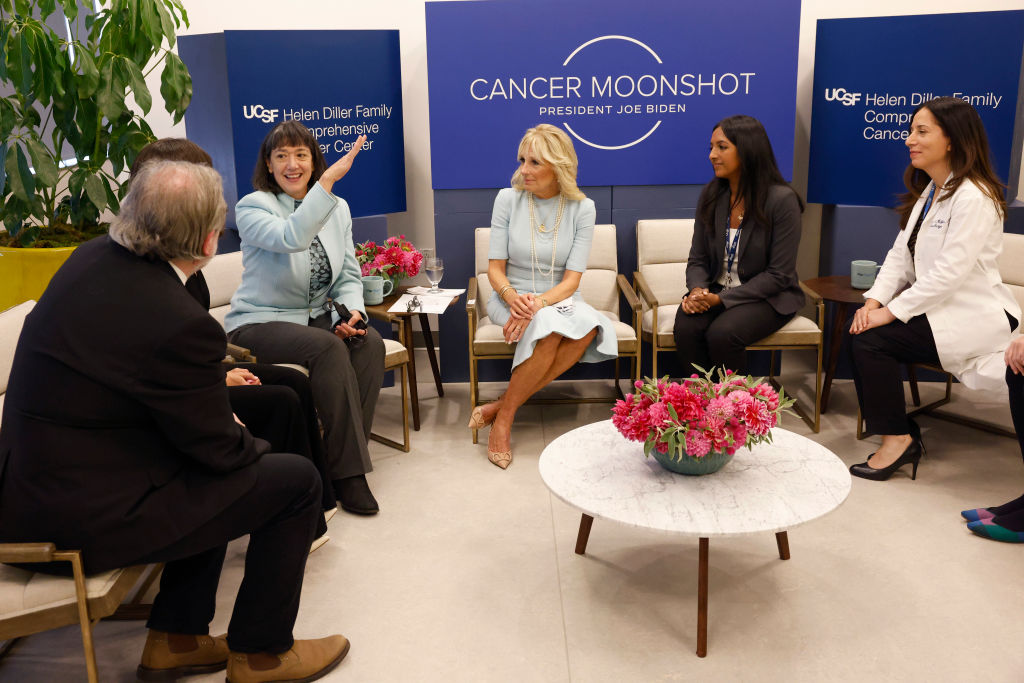The Fight Against Cancer Enters a New Phase
Breakthrough treatments hold promise for patients and investors.


Profit and prosper with the best of Kiplinger's advice on investing, taxes, retirement, personal finance and much more. Delivered daily. Enter your email in the box and click Sign Me Up.
You are now subscribed
Your newsletter sign-up was successful
Want to add more newsletters?

Delivered daily
Kiplinger Today
Profit and prosper with the best of Kiplinger's advice on investing, taxes, retirement, personal finance and much more delivered daily. Smart money moves start here.

Sent five days a week
Kiplinger A Step Ahead
Get practical help to make better financial decisions in your everyday life, from spending to savings on top deals.

Delivered daily
Kiplinger Closing Bell
Get today's biggest financial and investing headlines delivered to your inbox every day the U.S. stock market is open.

Sent twice a week
Kiplinger Adviser Intel
Financial pros across the country share best practices and fresh tactics to preserve and grow your wealth.

Delivered weekly
Kiplinger Tax Tips
Trim your federal and state tax bills with practical tax-planning and tax-cutting strategies.

Sent twice a week
Kiplinger Retirement Tips
Your twice-a-week guide to planning and enjoying a financially secure and richly rewarding retirement

Sent bimonthly.
Kiplinger Adviser Angle
Insights for advisers, wealth managers and other financial professionals.

Sent twice a week
Kiplinger Investing Weekly
Your twice-a-week roundup of promising stocks, funds, companies and industries you should consider, ones you should avoid, and why.

Sent weekly for six weeks
Kiplinger Invest for Retirement
Your step-by-step six-part series on how to invest for retirement, from devising a successful strategy to exactly which investments to choose.
To help you understand what is going on in the health sector our highly experienced Kiplinger Letter team will keep you abreast of the latest developments and forecasts (Get a free issue of The Kiplinger Letter or subscribe). You'll get all the latest news first by subscribing, but we will publish many (but not all) of the forecasts a few days afterward online. Here’s the latest…
There’s been lots of progress in fighting cancer. Mortality rates are down 33% since 1991. Patients who once had to endure a “sledgehammer” approach can now access more and better forms of care. But the medical world still has work to do.
New cancer cases continue to increase and could reach 35 million annually around the world by 2035, up from 20 million in 2022. The U.S. has made progress against some of the deadliest and most prevalent types of cancer, including lung, colorectal, prostate (among men) and breast (among women). At the same time, there’s been an uptick of cases among younger people, particularly of cancers related to rising obesity rates: Colorectal, pancreatic, uterine, etc. Some of these, like pancreatic, still have no proven treatments.
From just $107.88 $24.99 for Kiplinger Personal Finance
Become a smarter, better informed investor. Subscribe from just $107.88 $24.99, plus get up to 4 Special Issues

Sign up for Kiplinger’s Free Newsletters
Profit and prosper with the best of expert advice on investing, taxes, retirement, personal finance and more - straight to your e-mail.
Profit and prosper with the best of expert advice - straight to your e-mail.
Many lofty goals still seem out of reach. The Biden administration’s Cancer Moonshot hopes to halve America’s cancer death rate within 25 years. Already ambitious, the initiative may also suffer from a lack of political buy-in and thus funding. Further progress will depend on ongoing advancement in cancer treatment beyond the now-standard oncology regimen of surgery, chemotherapy and radiation.
Among the innovations currently inspiring optimism:
Immunotherapy — which stimulates a patient’s immune system against the cancer. One example is CAR-T cell therapy — changing certain white blood cells in the laboratory to fight cancer cells. Already used to treat several types of blood cancer —lymphoma, leukemia, etc — the process will now be refined and its applications expanded. Pharmaceutical companies are also investing heavily in antibody drug conjugates, which use the immune system to better target tumors with chemotherapy drugs.
Cancer vaccines are also in the works, courtesy of Moderna (in collaboration with pharma giant Merck) and BioNTech. Both firms are using the same mRNA tech as in their COVID-19 vaccines. The cancer vaccines show promise in clinical trials. BioNTech’s offering even seems to be effective against hard-to-treat pancreatic cancer.
Cancer screening is another area of focus. A bevy of new blood tests is trying to detect cancer before patients start to show symptoms. Some are focused on one type of cancer, such as Guardant Health’s colorectal test. Others, like GRAIL’s Galleri, aim to test for multiple cancers in one go, though critics say such tests are not infallible. As the incidence of cancer among young people increases, so too will cancer screening.
Advances in cancer treatment will be very lucrative for some companies. For example, oncology is far and away the world’s largest pharmaceutical market, and heavy hitters like Merck, Bristol Myers Squibb and AbbVie are poised to benefit. But patient access could be limited by the high price tag of new therapies.
This forecast first appeared in The Kiplinger Letter, which has been running since 1923 and is a collection of concise weekly forecasts on business and economic trends, as well as what to expect from Washington, to help you understand what’s coming up to make the most of your investments and your money. Subscribe to The Kiplinger Letter.
Profit and prosper with the best of Kiplinger's advice on investing, taxes, retirement, personal finance and much more. Delivered daily. Enter your email in the box and click Sign Me Up.

-
 Nasdaq Leads a Rocky Risk-On Rally: Stock Market Today
Nasdaq Leads a Rocky Risk-On Rally: Stock Market TodayAnother worrying bout of late-session weakness couldn't take down the main equity indexes on Wednesday.
-
 Quiz: Do You Know How to Avoid the "Medigap Trap?"
Quiz: Do You Know How to Avoid the "Medigap Trap?"Quiz Test your basic knowledge of the "Medigap Trap" in our quick quiz.
-
 5 Top Tax-Efficient Mutual Funds for Smarter Investing
5 Top Tax-Efficient Mutual Funds for Smarter InvestingMutual funds are many things, but "tax-friendly" usually isn't one of them. These are the exceptions.
-
 AI Sparks Existential Crisis for Software Stocks
AI Sparks Existential Crisis for Software StocksThe Kiplinger Letter Fears that SaaS subscription software could be rendered obsolete by artificial intelligence make investors jittery.
-
 A Scary Emerging AI Threat
A Scary Emerging AI ThreatThe Kiplinger Letter An emerging public health issue caused by artificial intelligence poses a new national security threat. Expect AI-induced psychosis to gain far more attention.
-
 An Inflection Point for the Entertainment Industry
An Inflection Point for the Entertainment IndustryThe Kiplinger Letter The entertainment industry is shifting as movie and TV companies face fierce competition, fight for attention and cope with artificial intelligence.
-
 Humanoid Robots Are About to be Put to the Test
Humanoid Robots Are About to be Put to the TestThe Kiplinger Letter Robot makers are in a full-on sprint to take over factories, warehouses and homes, but lofty visions of rapid adoption are outpacing the technology’s reality.
-
 Trump Reshapes Foreign Policy
Trump Reshapes Foreign PolicyThe Kiplinger Letter The President starts the new year by putting allies and adversaries on notice.
-
 Congress Set for Busy Winter
Congress Set for Busy WinterThe Kiplinger Letter The Letter editors review the bills Congress will decide on this year. The government funding bill is paramount, but other issues vie for lawmakers’ attention.
-
 The Kiplinger Letter's 10 Forecasts for 2026
The Kiplinger Letter's 10 Forecasts for 2026The Kiplinger Letter Here are some of the biggest events and trends in economics, politics and tech that will shape the new year.
-
 Disney’s Risky Acceptance of AI Videos
Disney’s Risky Acceptance of AI VideosThe Kiplinger Letter Disney will let fans run wild with AI-generated videos of its top characters. The move highlights the uneasy partnership between AI companies and Hollywood.